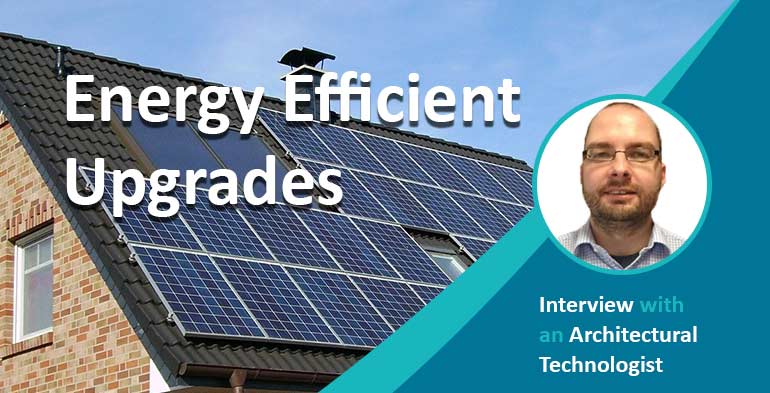Energy-Efficient Upgrades for Your Home
House
4
min read
05 May 2020

Making your home more energy-efficient will save you money in the long term, and reduce your carbon emissions, but making the adjustments necessary can be expensive. Fortunately, you can avail of a wide range of grants and incentives to make the process less costly. Here we discuss the most effective energy-efficient upgrades for your home and the assistance that is out there to help you make them. It turns out you can save money while helping to save the planet…
But where do you start, and what has the most impact? We asked Chartered Architectural Technologist, John Scanlon, from JS Design Architectural Solutions (jsdesign.ie) to talk us through his advice for homeowners.
1.Check Your BER Rating
‘The first thing you need to do if you want to improve your home’s energy efficiency is find out what its current energy rating is. You will need to hire an independent assessor (fee vary, but up to about €200), who will examine your home and give you a rating. The rating is based on how much energy your home needs for space heating, hot water heating, ventilation, the building fabric and lighting, so the BER Assessor will need to access all areas of your home.’
An A rating means you have a warm, energy-efficient home, and it could even boost the value of your house. If it’s lower, however, you need to read on…
How to improve your BER Rating
The SEAI suggest the following measures to improve your BER Rating:
|
Insulation
|
Heating
|
Other
|
|
Attic, walls and floor insulation
|
Upgrade old gas or oil boilers
|
Install renewable energy systems (e.g. solar, wind)
|
|
Pipe insulation
|
Install heating controls
|
|
|
Eliminate draughts
|
Install solar water heating
|
|
2.Insulation
‘Think of insulation as a blanket keeping your home warm: If your home is not properly insulated, your heating system has to work extra hard to replace the heat that is escaping,’ said John.
Attic Insulation
With up to a third of your heat escaping through the roof, John says adequate attic insulation is a no-brainer. ‘It is relatively cheap and easy to install, so if you’re lacking in the attic insulation department, find a reliable supplier as soon as possible.

3.Cavity Wall Insulation
‘Cavity wall insulation is a highly effective and relatively inexpensive way to insulate your home. It is only feasible if your home’s walls comprise two rows of brick or concrete block with a cavity between them, however.’
Internal Wall Insulation
Also known as dry lining, internal wall insulation works for solid walls, John explained that this is because the insulation is applied to the inside of any external walls.
External Wall Insulation
‘External wall insulation is also suitable for solid walls. It is attached to the outer surface of the walls of the house, wrapping the building completely entirely. This kind of insulation can be expensive, but there are grants available from the Sustainable Energy Authority of Ireland (SEAI):
Grants available:
|
Energy Upgrades
|
Grant Value
|
|
Attic insulation
|
€400
|
|
Cavity wall insulation
|
€400
|
|
Internal Insulation (Dry Lining)
|
|
|
Apartment (any) OR Mid-terrace house
|
€1,600
|
|
Semi-detached OR end of terrace
|
€2,200
|
|
Detached house
|
€2,400
|
|
External Wall Insulation (The Wrap)
|
|
|
Apartment (any) OR Mid-terrace House
|
€2,750
|
|
Semi-detached OR End of terrace
|
€4,500
|
|
Detached house
|
€6,000
|
To encourage greater energy efficiency, the SEAI will increase your grant by €300 if you perform three upgrades of your heating or insulation, and by an additional €100 if you complete four.’
4.Heating Improvements
Fossil-fuel heating damages the environment by raising carbon emissions substantially, and it is also inefficient. John says you can save money and reduce your carbon emissions with a heat pump system or solar electricity and water heating.
Heat Pump System
‘Heat-pumps convert energy from the environment outside of your home into heat. If your home is properly insulated, they are very economical to run and highly reliable sources of comfortable heat.
You can get different types of heat pump to extract heat from various sources—air to water, ground source to water, water to water, exhaust air to water, and air to air. There is a grant of €3,500 available for each of these systems, apart from air-to-air systems, which attract a grant of €600.
Solar Electricity & Heating
‘Solar thermal systems can meet up to two-thirds of your overall hot water requirements over the year, saving you substantial amounts on your annual hot water heating bills.
If you want to take it a step further, invest in a solar electricity system and install solar panels on your home. Ireland is hardly the Costa del Sol, but you can still expect to save between €200 and €300 on your annual energy bills with a solar PV system. Grants for the installation of solar PV panels and battery energy storage systems are available for homes built and occupied before 2011 and are capped at €2,400.’
Heat controls
‘If you are not in a position to upgrade your heating system, you can still install heating controls to seriously reduce your energy wastage. In fact, you can reduce your energy usage by as much as 20% with simple-to-use heating controls and thereby save substantially on your home heating bills.
Grants of up to €700 are available to install heating controls in homes built before 2006.’
Simple Changes You Can Make
‘Upgrading your insulation and home heating systems can feel like a daunting prospect. While you are considering what to do in your home to make it more energy-efficient in the long-term, there are several simple changes you can make in the meantime:
When it is time to change the washing machine or fridge, go for an energy-efficient A-rated appliance. They will last longer and use less power, saving you money and reducing your carbon footprint. Here are other simple measures:
-
Switch your light bulbs for LED versions. They last so much longer.
-
Switch lights and electrical appliances off when not in use
-
Close curtains and blinds at night to keep in the heat.
-
Seal draughty doors and windows.
If you’re thinking of upgrading your home and need financial assistance, you can get in touch with your local credit union. Many credit unions do both dedicated Green Home Improvement Loans and Home Improvement Loans.